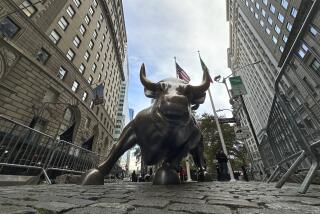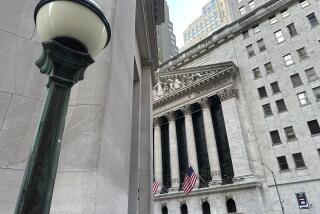FINANCIAL MARKETS : Durable Goods Data Sends Stocks, Bonds Reeling
Wall Street stocks, bonds and the dollar bounced back to end with modest losses Wednesday as financial markets overcame a reaction to a much stronger than expected rise in durable goods orders in August.
The Dow Jones industrial average ended down 3.25 points at 4,762.35, having rebounded from a drop of more than 50 points earlier. In the broader market, declining issues led advances 14 to 8 on active volume of 413 million shares on the New York Stock Exchange.
The Nasdaq composite index, down more than 29 points, or 2.9%, at one point amid a selloff in technology stocks, ended down 11.51 points, or 1.1%, at 1,026.54.
Analysts said stocks were rocked by news that orders for costly manufactured goods climbed at the sharpest rate in a year during August. New orders surged 4.9% last month to a seasonally adjusted $163.9 billion--much stronger than anticipated by Wall Street economists, who had forecast a 2.7% gain. The increase followed a revised drop of 1.8% in July.
The news set off waves of selling in stocks. The action came just one day after the Federal Reserve Boardâs policy-making Federal Open Market Committee decided to keep interest rates unchanged.
Traders were worried that if economic data over the next several weeks continues to show a strong economy, the Fed might not lower rates at either of its next two meetings, scheduled for November and December.
âThe market is worried that if these kinds of numbers are sustainable, there may be inflation going forward,â said Phil Orlando, equity portfolio manager at First Capital Advisers.
Analysts said the late recovery was assisted by a strong rebound in bonds.
The yield of the key 30-year Treasury bond closed unchanged at 6.57%.
âAs soon as bonds started turning off their lows, stocks started improving,â said Trude Latimer, an independent market strategist. Up to that point, she said, âsell programs exacerbated the trend that was in place.â
Yields on five-year Treasury notes fell in Wednesdayâs auction to the lowest level in three months. The high yield was 6.14%, down from 6.37% at the last auction on Aug. 23. It was the lowest rate since five-year notes sold for 5.91% on June 28.
The notes will carry a coupon interest rate of 6.125%, with each $10,000 in face value selling for $9,993.20.
A total of $11.5 billion in notes was sold, with bids totaling $27 billion.
The dollar was undermined by the selling in U.S. stocks and bonds and by gains in the German mark against the Italian lira and British pound.
In late New York trading Wednesday, the dollar fell to 100.46 Japanese yen from 101.08 yen late Tuesday. The dollar also fell to 1.4243 German marks from 1.4373 marks late Tuesday.
Among Wednesdayâs highlights:
* In the technology group, Cisco Systems fell 1 5/8 to 68, and Bay Networks tumbled 2 3/8 to 52 as computer networking stocks took a beating.
Other technology issues attracted bargain hunting during the day. Traders noted that some issues have fallen 20% from their highs.
* Hayes Wheel International jumped 5 5/8 to 26 1/2 after the company said it received an unsolicited offer from Varity to purchase the rest of its stock for $25 a share.
Traders said the rise in Hayes Wheel is a sign that investors expected a higher bid. Varity, which already has a 46% stake, was off 3/8 at 43 3/8.
* American Express was off 3/8 at 43 1/8. The company announced after the stock market closed that Jeff Stiefler was resigning as president and a member of the board of directors.
* Morrison Restaurants rose 2 1/2 to 20 1/4. The company said its board of directors approved a plan to spin off its family dining and health-care businesses to shareholders to create three separate publicly held corporations.
The Standard & Poorâs composite index of 500 stocks fell 0.37 to 581.04.
The American Stock Exchange index was off 1.88 to 540.65.
The NYSE Composite index of all listed common stocks fell 0.50 to 311.32. The average share was down 6 cents.
In commodities trading, oil prices rose on a report of lower inventories of crude and heating fuel, and natural gas prices fell ahead of data showing stocks are growing but are still smaller than a year ago.
October gasoline gained 0.76 cent to 54.55 cents a gallon, October heating oil added 0.79 cent to 49.02 cents, and November crude rose 24 cents to $17.57 a barrel.
November natural gas sank 3.7 cents to $1.726 per million British thermal units, ahead of an American Gas Assn. report that showed U.S. supplies increasing but still well below year-ago levels.
December coffee fell 4.60 cents to $1.152 a pound after a one-day rise, as speculators resumed selling as rain continued to fall in Brazil.
In foreign trading, Mexican stocks fell to 12-week lows, led by shares of banking, cement and construction companies, amid concern that rising interest rates and a weakening peso will hurt earnings.
Stocks dropped 68.95 points to 2,343.06 on the key Bolsa index. It was one of the worst days for the market since the financial mayhem that followed last yearâs peso devaluation.
Mexicoâs peso was hammered by the stock market selloff, slipping nearly 5 centavos to 6.46 per dollar. Analysts said foreigners were selling stocks, changing their money back into dollars and getting out of Mexico until things improve.
Overseas, Londonâs FTSE-100 closed 38.3 points lower at 3,485.0. In Tokyo, the Nikkei 225-share index rose 340.45 points to 18,262.43.
In Germany, the 30-share DAX index fell 42.41 points to close at 2,185.44 points.
More to Read
Inside the business of entertainment
The Wide Shot brings you news, analysis and insights on everything from streaming wars to production â and what it all means for the future.
You may occasionally receive promotional content from the Los Angeles Times.










